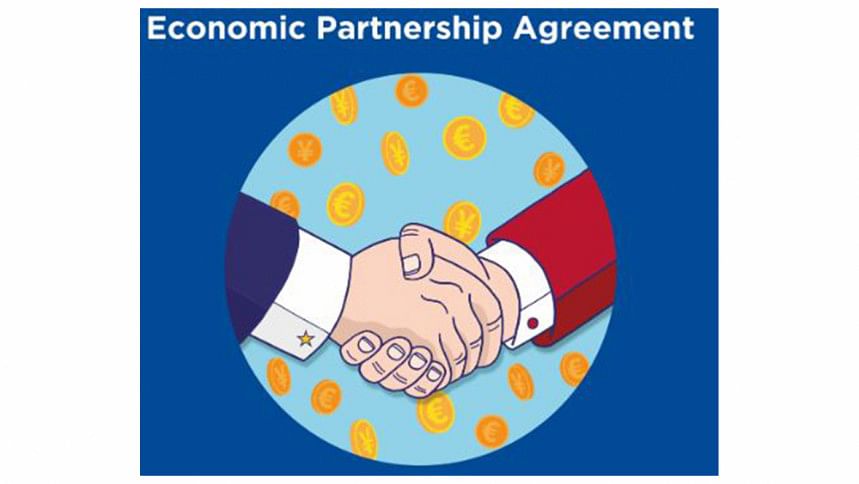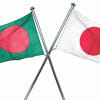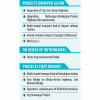Bangladesh focuses on lower duty, higher investment

Bangladesh focused on areas of duty-reduction and increasing investment from Japan during recent discussions on the potential signing of an Economic Partnership Agreement (EPA) between the two countries, according to an official of the commerce ministry.
During the discussions held at a city hotel in Dhaka last week, Japan said it would protect its domestic agriculture industry from implications of the potential EPA as the country is self-sufficient in this regard.
This means Bangladesh may not enjoy any duty benefits on agricultural exports to Japan even if an EPA is signed between the two countries, Senior Commerce Secretary Tapan Kanti Ghosh said yesterday.
"But Japan can protect any of its local industries should it feel the need to," he said, adding that Bangladesh has the same option.
Bangladesh's main target for the EPA is to enjoy zero-duty benefit on shipments of garment items, leather and leather goods, electronics and other products, Ghosh told The Daily Star over phone.
This is because Bangladesh's export basket has fewer products compared to the diversified portfolio of Japan, he said.
Ghosh informed that Bangladesh also wants removal of the average 18 percent duty levied on all shipments to Japan.
"Besides, the country seeks more investment from Japan as the recent trend of Japanese companies coming to Bangladesh suggests they have a promising future here," he added.
During his visit to Dhaka last week, Yasutoshi Nishimura, the minister of economy, trade and industry of Japan, said Bangladesh has potential for attracting the relocating Japanese factories as entrepreneurs from the island nation are diversifying their locations in the Southeast Asia and Asean regions.
"I expect more companies will come to Bangladesh," Nishimura said while speaking at a summit on "Bangladesh-Japan Economic Relations for the Next 50 Years" in Dhaka last week.
The relationship between Japan and Bangladesh had turned from a comprehensive one into a strategic partnership through a summit in April earlier this year.
However, there remain areas for improving the business climate and thereby attract more trade and investment, he added.
Regarding Bangladesh's industrial upgradation, the Japanese minister said Japan's government is already supporting the construction of different infrastructure projects through the Japan International Cooperation Agency (JICA).
For instance, the Matarbari power plant and deep seaport are being established with Japanese financing.
Besides, the JICA signed a memorandum of understanding in April this year for the capacity building of agencies promoting investment in Bangladesh.
Also, the Bangladesh Special Economic Zone (BSEZ), which is known as the Japan economic zone, has been under construction at Araihazar in Narayangnaj since last December while the metro rail project in Dhaka is ongoing as well.
The Japanese minister also said factory relocation has already started as the Japanese company Honda opened a factory in Bangladesh.
Similarly, the BJIT, an award-winning global IT company, has also started operations in Bangladesh.
Currently, nearly 350 Japanese companies are operating in Bangladesh, with more than $380 million invested in the country.
Of the total companies, 85 percent want Bangladesh and Japan to sign the EPA for increasing bilateral trade and investment.
In 2022, Bangladesh received a record high of more than $100 million as investment from Japan.
Meanwhile, the number of Japanese companies in Bangladesh roughly quadrupled over the past decade, Nishimura added.
Japan and India are two export destinations in Asia, where Bangladesh's export earnings reached $2 billion, Munshi said while addressing local and Japanese businessmen at the summit.
High-powered Bangladesh and Japan delegations completed the second round of discussions on the joint study for signing the EPA in Dhaka last week.
A senior official of the Japanese government who attended the discussion said his government would not allow agricultural products under the duty-free benefit even if the EPA is signed.
Ghosh said formal negotiations for the EPA will start within this year as the third and final discussion on the joint study on its feasibility will be held soon.

 For all latest news, follow The Daily Star's Google News channel.
For all latest news, follow The Daily Star's Google News channel. 








Comments